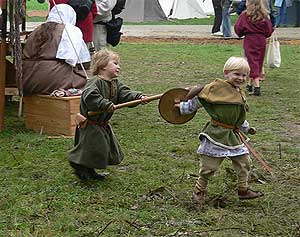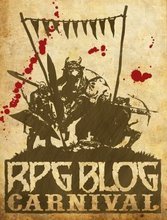 Finding a good name is sometimes the hardest part of designing an NPC. You want something more exotic than “Fred the Fighter”, but “Frewxyque the Grand Thunder Duke” becomes too hard to say with a straight face after the first first time. Baby name books can help, but some of the best names come from real-world sources. Beyond ‘Fred’ is a series that lists names from various sources broken down by region and/or time period.
Finding a good name is sometimes the hardest part of designing an NPC. You want something more exotic than “Fred the Fighter”, but “Frewxyque the Grand Thunder Duke” becomes too hard to say with a straight face after the first first time. Baby name books can help, but some of the best names come from real-world sources. Beyond ‘Fred’ is a series that lists names from various sources broken down by region and/or time period.
We’re doing Anglo-Saxon names this time. Some of these names are still in use, but others are as unusual as any gamer-made names. As usual, I’ve separated them out into male and female names.
Name Structure
Historically, Anglo-Saxons had no surnames as we would think of them. Sometimes, a person (usually aristrocracy) would be identified by a trait or play on words (Aethylred the Unready, for example) or by a connection to a famous ancestor. If your game setting requires a character to have more than one name, you can always use a place name (“of Meadowbrook”), a profession name (“Smith” or “the Baker”), or “son/daughter of” and a parent’s name (“Oswynson”).
Note: many Anglo-Saxon names use the letter “eth” (Ð, ð). Since I’m not concerned with historical accuracy here, I’ve substituted “th” for any eth in the names below.
(Photo courtesy of Flickr, ©Snake3yes 2006)
Male Names
- Acwellen
- Aethelred
- Aethelwulf
- Aheawan
- Badanoth
- Baldred
- Beornric
- Caedmon
- Cælin
- Cenhelm
- Ceolwulf
- Cuthen
- Delwyn
- Denewulf
- Eadfrid
- Eadric
- Eanlac
- Elwyn
- Fremund
- Frithulaf
- Godfrith
- Grimbald
- Guthred
- Hardred
- Hereric
- Horik
- Horsa
- Idmaer
- Ingwulf
- Irminric
- Leofric
- Liudolf
- Merewald
- Morcar
- Ordmaer
- Osred
- Oswyn
- Raedfrid
- Rægenhere
- Reduald
- Romund
- Saeward
- Selred
- Sigeric
- Sighere
- Stithwulf
- Swithun
- Theodgar
- Thrydwulf
- Thunor
- Trumwin
- Turec
- Waldere
- Wihtlac
- Yric
- Wulfhere
Female Names
- Aerlene
- Aethelthryth
- Alduulf
- Alodia
- Anlienisse
- Baldeth
- Beadohild
- Bregusuid
- Burwena
- Ceolwynn
- Cynethryth
- Cynwise
- Domneva
- Eadwynn
- Eanfled
- Eanwin
- Eoforwine
- Frigyth
- Godwyna
- Golderon
- Hendina
- Hild (or Hilda)
- Hrotsvitha
- Mildgyth
- Modthryth
- Oslafa
- Osthryd
- Rimilda
- Roswitha
- Saewynn
- Somerild
- Sunngifu
- Tonild
- Tortgith
- Turgiua
- Wenyld
- Winfrith
- Wulfrun
- Wulfwynn
- Wynflead
Sources
- Anglo-Saxon Dithematic Names
- Anglo-Saxon Names
- Behind the Name: Anglo-Saxon Names
- Birth Care: Anglo-Saxon Names







